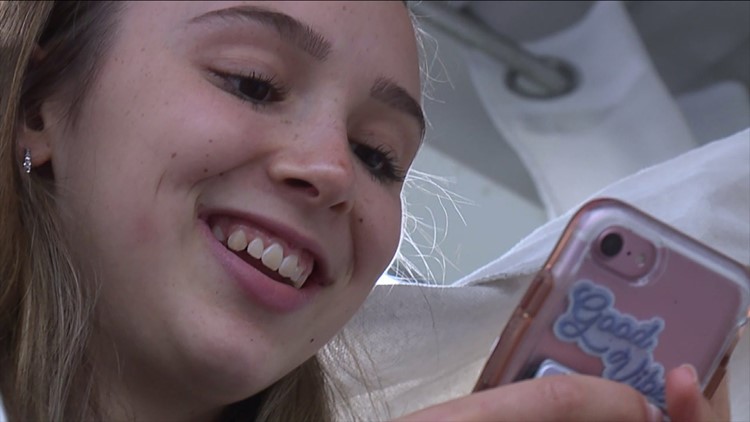HANOVER, York County, Pa.--
"If you got a picture that`s like 82 likes, might as well delete it." Jordan Salafia and her friend Maddie Swam are 16-years-old and to them, their world revolves around their phones and social media.
Jordan says, "My phone basically means communication to the outside world." Maddie echos the need for her device, "If I don`t have it for a while, it feels off, like, I need it."
It is that need for their phones that is concerning to psychologist, Dr. Ray Christner with Cognitive Health Solutions in Hanover York county.
He says, "Teens that use a lot of technology-- two or more hours-- are more prone to have things like anxiety or depression and sleep disturbance."
Dr. Christner says there are several 'red flags' when it comes to social media usage, "One of the things we talk about as far as a stressor of social media is what a lot of teens refer to as, `FOMO` or `fear of missing out`."
And that fear is great enough to keep the younger generations glued to their devices.
'Maybe they`re not gonna know what the latest gossip was the next morning and they don`t know how to then socially interact when they`re at school.'
Dr. Christner says younger people are constantly seeing a skewed reality, "No one posts that they are struggling with algebra. Everybody posts all these good things that they`re doing... We refer to it as highlight reels where they watch everybody`s posts."
And while they are watching, the thoughts start flowing. Those thoughts aren`t always the most uplifting, especially for teens who may be easily influenced by others.
Jordan says the 'highlight reel' can get to her, "You definitely get a little bit jealous and you`re like, hmm wish I was doing that. Or I wish I was with them or them... I just wish I was them."
The self-esteem of a teenager can undergo some serious highs and lows when scrolling through their feeds, according to Dr. Christner, "In some ways, social media has created people as products and our value is then based on how many likes, or how many shares or how many positive comments we get."
Dr. Christner refers to this as 'social media currency' where people are basing their worth off responses on social media.
Maddie says social media directly impacts the way she feels, "It definitely makes me feel a little bit better. When a pic gets a lot of comments, it makes you feel better about yourself."
The girls, both saying the response, or lack thereof on a picture can really take a toll, "If it`s a picture of me and I am only getting like 82 likes, I feel kind of offended."
Maddie says, "Yeah it definitely brings down your self esteem a little bit. It makes you feel a little bit worse."
To avoid those negative feelings, Maddie says a lot of thought and time go into each of their posts...
"It`s definitely like if you post, like you got a really high amount of likes on a picture and then you post another picture and its not getting as much likes like what did I do wrong?"
But as Jordan explains, posting the photo is only the half of it, "Then finally the anxiety of posting it and seeing like what your comments should be like and what should happen with that. Then it is going through every 5 seconds to check who is liking it, who saw it, stuff like that I guess."
With phone in hand, the feeds always updating, It can be hard to have a quality conversation with a social media wielding teen.
Jordan says it can be frustrating because the way teens use social media is hard to understand to some, "The older generations they just never had that so its not like they would know what we are like thinking or going through I guess..."
Some parents are finding themselves left wondering what they can do to help build their kids up without using likes and shares. Dr. Christner says that can be easier said than done though, "We can always tell our kids how great we think they are, but they`re not gonna believe us as much as everybody else... It takes time though and it takes work-- it`s not a quick piece. It`s getting them to just pay attention to who they want to be and taking steps in that direction."
Dr. Christner says engage in dialogue with your kids. Find something where there is no judgement and there is no blame. He says just do something or talk about something you can enjoy together.
"Social media is not a bad thing. Social media is just something we haven`t figured out how to use well yet."
Dr. Christner says in order to follow social media safe practices, parents can refer to the acronym 'T.A.M.E.'
The 'T' stands for taking it seriously.
The 'A' is for audit. Dr. Christner says it is important to look at our posts and be accountable for them.
The 'M' is for model good behavior. How a parent uses social media can have an impact on the way a kid does.
And finally 'E' which means engage. Dr. Christner says don't forget to engage in things that make you happy. He also mentions it is ok to take a holiday from social media.



